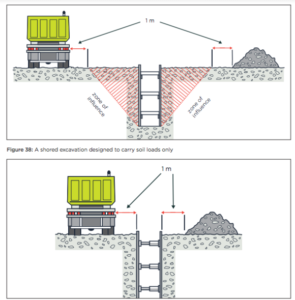Machinery hazards and managing traffic on-site
Jun 09, 2021

Excavation work generally involves heavy machinery hazards and the need to manage vehicle and foot traffic on-site. Making sure you understand these hazards and how best to minimise these risks is key to ensuring the safety of those working in and around excavations.
Pre-start checks
Always check your equipment is fit for use at the beginning of each day.
A trained and competent machinery operator should be conducting a pre-start check before use. This gives you certainty that your equipment is good to go for the day and won’t cause you any unexpected problems or delays. Things to check are:
Visual checks before turning the equipment on:
- Fluid and oil levels are sufficient and no leaks
- Battery is clean and charged
- Safety mechanisms are in place, working and not damaged
- Warning signage is in place and readable
- Attachments, clips and pins are in working order and without damage
- Hydraulics are undamaged and lubricated
Stationary function test while equipment is on:
- Horn and reversing alarm sound
- Control panel, lights and pedals are all fully operational
- Bucket and arms fully extend and tilt as required
Moving function test:
- Steering is in good order
- Brakes function
We recommend using your manufacturer’s pre operational check sheet and keeping these records with your equipment. Use of the HazardCo Heavy Machinery Prestart checklist will help you cover these specific checks.
Traffic Management
Managing excavations risks also means managing the risks of other contributing factors such as traffic. Keeping vehicles and pedestrians clear of heavy machinery and excavation works could mean you’re going to need a traffic management plan. When putting your traffic management plan in place you’ll need to consider the following:
- Directing traffic, including cyclist and pedestrians if applicable
- Delivery and set down areas and schedules
- Worksite layout, speed limits, traffic flow, fencing/barrier placement and exclusion zones
- Safe loading/unloading and turning/reversing practices
- Site restrictions such as noise or traffic volume
- When the site is unattended and how the excavations are being managed at these times
- Emergency procedures
Having a traffic management plan in place and discussing this at the time of site inductions means everyone entering the site is aware of the site rules, safe practices and expectations before commencing work.
If you need assistance with a traffic management plan, please contact the advisory team at HazaradCo and we will happily talk you through the requirements.
Zone of Influence
Know your limits
Heavy machinery, as its name suggests, is heavy and carries a lot of weight. If being operated too close to excavations it can affect the stability of your excavations causing them to collapse. All heavy vehicles, material and spoil should remain out of the zone of influence plus a metre unless specific designs are in place showing it can support such weight bearing.

Tip-over
Uneven and unstable grounds can often lead to machinery tip-over. Tip-overs can cause serious injuries or worse, fatalities. Know the ground conditions you are working with and make sure you are following the outlined safety rules for your site. Ensure the following points are considered:
- the site operator must have systems to ensure work is planned and operating areas assessed prior to work by the supervisor and machine operator
- digger operators do a dynamic risk assessment before starting each job
- the safest route is selected when moving and excavator around the site
- there is never digging underneath an excavator
- work is always carried out a safe distance from the edge of a face
- Standard Operating Procedures should be written where possible
- work areas are designed to control the hazards
- roll-over protection is fitted to all cabs including excavators, and ensure operators
- wear seat belts and keep doors closed
- there are always two exits from the excavator.
If you would like more information or to chat with one of our friendly Advisory team please give us a call on 1800 954 702














